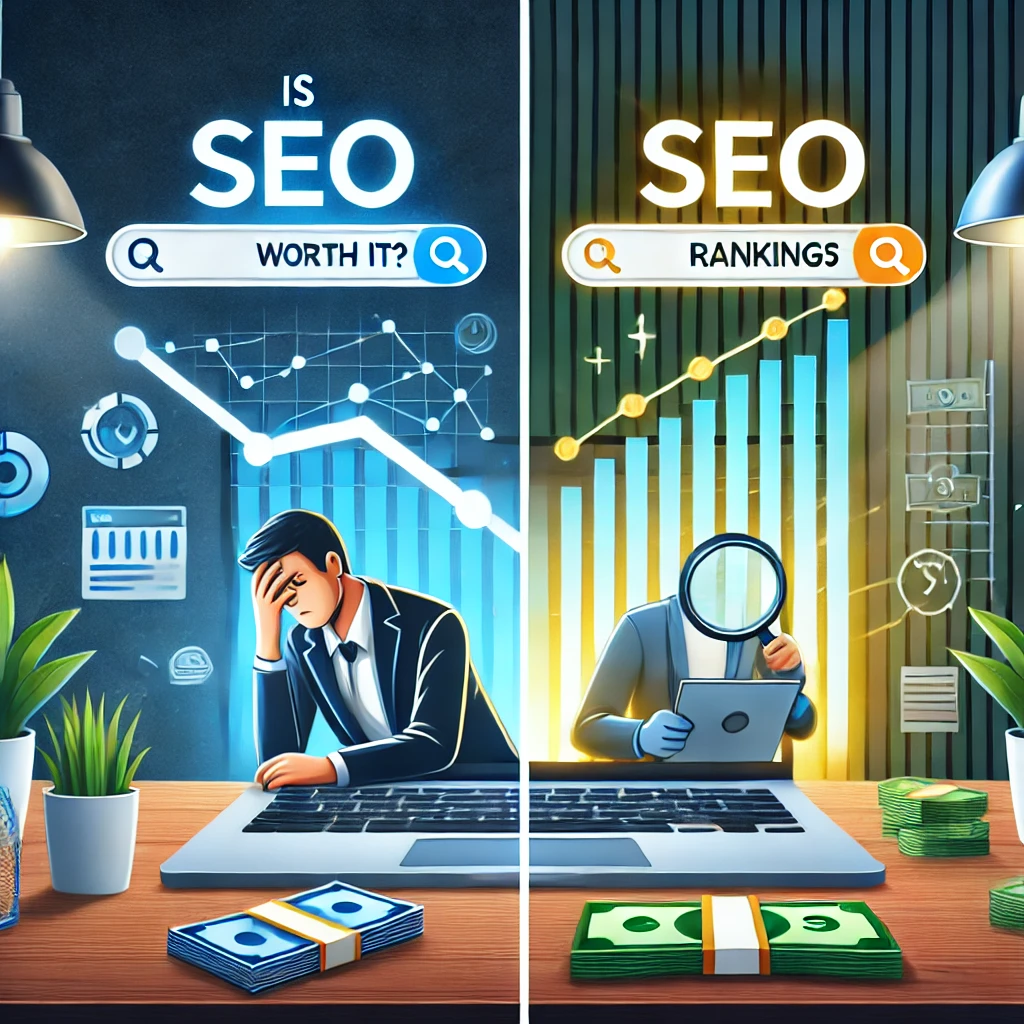In today’s digital landscape, the importance of SEO, or Search Engine Optimization, cannot be overstated. While many are talking about the role AI and Large Language Model’s will play in the future of search, one thing is clear – they reference sources found in search results.
As someone well-versed in modern marketing techniques, I understand that SEO is a powerful tool for enhancing your website’s visibility on search engines like Google. At its core, SEO involves tailoring website content to improve rankings and draw more relevant traffic. With a majority of consumers still turning to search engines to guide their purchase decisions, ranking highly for the right keywords can significantly impact a business’s success.
However, the question remains: is SEO worth the investment? From my experience, the return on investment for a robust SEO strategy can be substantial – but it’s not for every business and SEO is not a one-size-fits-all solution. Its efficacy hinges on various factors, including the competitiveness in your industry, the quality of your SEO strategy, and the continuous updates in search engine algorithms, among other things. When assessing whether SEO is suitable for your marketing mix, consider the long-term value of search visibility against the ongoing effort and resources required to maintain it.
Use this SEO ROI calculator to help determine if SEO is right for you. You can play around with it to determine what your monthly traffic would need to be in order for you to break even, or profit from your SEO. Keep in mind, however, that the benefits of SEO tend to outlast your time investing in it, meaning that if you stick with it long enough to see results, you can stop paying for it, and continue to benefit from it (assuming you’re not struck down harshly by one of Big G’s algorithm updates).
SEO ROI Calculator
The Essence of SEO for Businesses
In the modern marketplace, achieving a strong online presence and enhancing visibility are crucial. SEO harnesses the power of search engines like Google to bolster organic traffic and connect businesses with prospective customers effectively.
Understanding Organic Search and Visibility
Organic search is a vital source of web traffic and involves users finding websites through non-paid search engine results. I know from experience that when a business’s website is optimized for these results, it gains increased visibility. Potential customers are more likely to discover services or products if the website appears on the first page of Google search results. Visibility is the linchpin of successful SEO; it’s not just about appearing on search engines, but about being visible at the moments when customers are seeking what a business offers.
- Key components that influence organic search and visibility:
- Relevant keywords
- Quality content
- Mobile-friendliness
- Page speed
- Secure and accessible website
Evaluating SEO’s Impact on Traffic and Customer Acquisition
An effective SEO strategy is about more than just driving traffic—it’s about driving the right traffic. I focus on attracting visitors who are most likely to become customers or clients, which is essential for any conversion-focused marketing effort. By monitoring metrics like sessions, bounce rate, and conversion rate, I can discern whether SEO efforts are attracting potential customers who are truly interested in what a business has to offer. Moreover, a sound SEO strategy elevates brand awareness, which can lead to organic growth through word-of-mouth and social sharing.
- Metrics to evaluate SEO’s effectiveness:
- Increase in organic sessions
- Higher search rankings for targeted keywords
- Improved click-through rates (CTR)
- Conversion rates of organic traffic
- Return on investment (ROI) from SEO activities
In harnessing SEO, companies ensure they’re not just visible, but also relevant and compelling to those who are already seeking solutions they provide.
Strategic SEO Implementation and Its Advantages
I understand that implementing a well-strategized SEO plan can significantly elevate the visibility of a website in search engine results, fostering an increase in organic traffic and enhancing the credibility of a business.
Keyword Research: The Foundation of SEO
Keyword research is the bedrock upon which effective SEO is built. It involves identifying the terms and phrases potential customers are using to find products or services related to a business.
- Competitive Analysis: I investigate competitors to determine which keywords are driving traffic to their sites.
- Search Volume and Intent: I focus on keywords with a high search volume and a clear intent that aligns with my content strategy.
- Long-Tail Keywords: These are less competitive and more specific, often leading to better conversion rates.
Combining these elements forms a robust foundation for a tailored SEO strategy that targets the right audience.
Content Quality and Structuring for SEO
For the content to resonate with both readers and search engines, it must be of high quality and structured correctly.
- Originality: All my content is original, deterring any penalties for duplicate content.
- Relevance: The topics are pertinent to my audience’s interests and search behavior.
- Hierarchy: I use headers (H1, H2, H3) to structure content, making it easier for search engines to understand and index.
Additionally, integrating keywords naturally within the content, coupled with multimedia elements, can enhance user engagement and dwell time – two factors that search engines consider when ranking pages.
Building Authority with Backlinks
Backlinks are referrals from other websites and they play a pivotal role in building online authority.
- Quality Over Quantity: I earn backlinks from reputable and relevant websites to reinforce my site’s credibility.
- Avoiding Spammy Tactics: I stay away from black-hat methods like buying links, which could result in penalties.
- Regular Audits: I routinely assess my backlink profile to ensure it remains healthy and beneficial to my SEO efforts.
By concentrating on creating high-quality content and leveraging relationships with trustworthy domains, I foster a network of authoritative backlinks that solidify my standing on the SERP.
Measuring SEO Success: ROI and Other Metrics
Determining the true impact of SEO efforts hinges on specific metrics and their effect on the bottom line over time.
Understanding SEO Metrics and KPIs
In the realm of SEO, it’s crucial to track key performance indicators (KPIs) to gauge my work’s success accurately. Rankings, for instance, offer immediate insight into where my pages stand in search results, but they’re just the starting point. I monitor traffic growth, focusing keenly on organic visitors, as they reflect my SEO’s drawing power. Conversions and leads generated from this traffic are pivotal as well; I track how many visitors complete desired actions, be it signing up for a newsletter or purchasing a product.
The value of every conversion informs me about the ROI. For instance, if I know each lead is worth $100 on average, and my SEO efforts bring in 100 new leads, that translates to a $10,000 potential increase in revenue. The cost of achieving these results, ranging from content creation to technical SEO improvements, must be subtracted to understand the net gain.
- Revenue: An ultimate indicator of success; I look for increases attributable to SEO.
- Cost: I maintain a breakdown of all expenses tied to my SEO activities.
- Effort: Time invested is factored in, recognizing that SEO is a long-term play.
- Results: Beyond rankings, I seek measurable outcomes like increased sales or leads.
The Cost-Effectiveness of SEO Over Time
SEO is a marathon, not a sprint. Initially, I brace for higher expenditure of both time and money as groundwork is laid. Optimizing a site, researching keywords, and creating quality content come with upfront costs. However, the sustained investment is where I see the most significant ROI. Over time, the cost of acquiring traffic decreases as I build a strong organic presence and eventually you can pull the foot off the gas pedal and decrease your investment in SEO while recouping some of your earlier costs.
The beauty of SEO lies in its cumulative effect. Solid content continues to attract visitors months or even years after publication, which can result in a steady increase in sales and leads with no additional costs. To assert that SEO is worth it, I chart the trajectory of organic conversions over time against my SEO investments. It allows me to witness how strategic, targeted efforts can diminish costs and amplify returns. This is the essence of the cost-effectiveness of SEO — the initial efforts compound, leading to lower costs per lead and greater revenue as time progresses.
- Time: The longer my quality SEO practices are in place, the more pronounced their impact on revenue.
- Effort vs. Results: While the initial effort is substantial, consistent ranking improvements and conversions manifest over time, validating my strategy.
- Marketing Strategies: Integrating SEO with other marketing efforts can better leverage investments and maximize returns across the board.
Choosing the Right SEO Approach for Your Business
Developing a strong SEO strategy is essential for enhancing your online presence and ensuring your company stands out on search engines. I will discuss how small businesses in particular can benefit from local SEO tactics.
Local SEO for Small Businesses and Local Visibility
Local SEO is a powerful tool for small businesses aiming to increase their local visibility. If I run a small business, focusing on local SEO allows me to compete effectively within my geographic area without stretching resources too thin on broader SEO strategies.
- Identify Local Keywords: I would start by researching and identifying keywords that are relevant to my local customer base. These might include terms specific to my city, neighborhood, or region.
- Optimize Google My Business Listing: It’s crucial to have a well-optimized Google My Business listing. This includes accurate business details, working hours, and replying promptly to reviews.
- Build Local Citations: I’d ensure my business is listed correctly across various local business directories. Consistency in my business’s name, address, and phone number (NAP) across the web can help improve my local search rankings.
- Encourage Customer Reviews: Positive reviews can play a big role in local SEO. I would actively encourage satisfied customers to leave reviews on my Google My Business profile and other relevant platforms.
- Create Local Content: Content that speaks to local events or issues can attract local search traffic. I would focus on creating blog posts, videos, or articles that resonate with the local audience.
In summary, by tailoring SEO practices to my local market, my business can enhance its online findability and attract more customers from within my community. If I feel I lack the expertise or resources to execute these strategies effectively, outsourcing to a reputable SEO agency or hiring a specialist could be a prudent investment.

















